Best Architecture and Engineering (AE) ERP Software
A/E ERPs are industry-specific systems integrating several essential functions, such as project management and accounting. We’ve evaluated the top platforms for businesses of all sizes, from small firms needing accurate invoices to enterprises managing global operations.
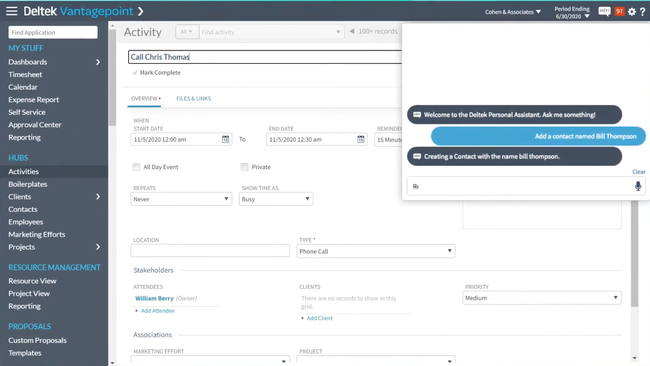
- Modular pricing system
- Built-in proposal creator
- CRM integrates with email for client management
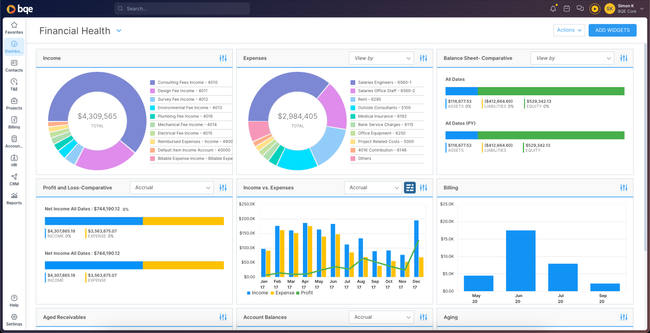
- Detailed Gantt charts
- Interdependent task support
- Accurate data from time card module
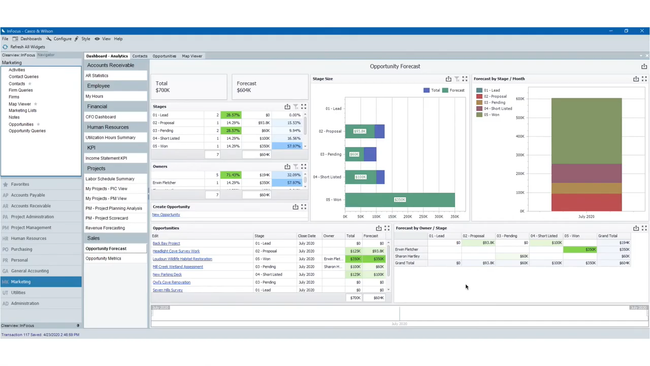
- Integrated project ERP
- Detailed resource scheduler
- Capacity planning and reporting
In this guide, we reviewed the top ERP systems that support architecture and engineering firms of all sizes and functionalities, like project management, task allocation, and CRM.
| System | Pricing Model | Deployment | Ideal Company Size (by employee count) |
|---|---|---|---|
| BQE CORE | Modular | Cloud or on-premise | 10-99 |
| Deltek Ajera | All-in-one suite | Cloud or on-premise | 10-50 |
| Unanet ERP AE | All-in-one suite | Cloud or on-premise | 50-200 |
| Deltek Vantagepoint | Tiered packages | Cloud or on-premise | 50-200 |
| Unit4 ERP | All-in-one suite | Cloud | 200+ |
- Deltek Vantagepoint: Best for Midsize Firms
- BQE CORE: Best for Project Management
- Unanet ERP AE: Best for Resource Management
- Deltek Ajera: Best for Small Firms
- Unit4 ERP: Best for Large Firms
Deltek Vantagepoint - Best for Midsize Firms
Deltek Vantagepoint offers an effective CRM module to help midsize firms manage client relationships. The dashboard reflects upcoming milestones, current pursued projects, and daily activities to help you stay organized. You can also set reminders that link directly to your calendar. Whether it’s a client meeting to close a sale or a proposal deadline, you can ensure you never miss important tasks.
The CRM includes the Connect tool, which integrates with Gmail or Microsoft Outlook to streamline client communications. Sales representatives often switch between email and CRM platforms to enter new clients, update statuses, or schedule meetings. Connect recognizes emails from your contact list, automatically showing their business and recent projects. You can even log the email as an activity, saving all its information for future reference. This provides instant data transfers between the two systems, reducing time-consuming manual data entry.
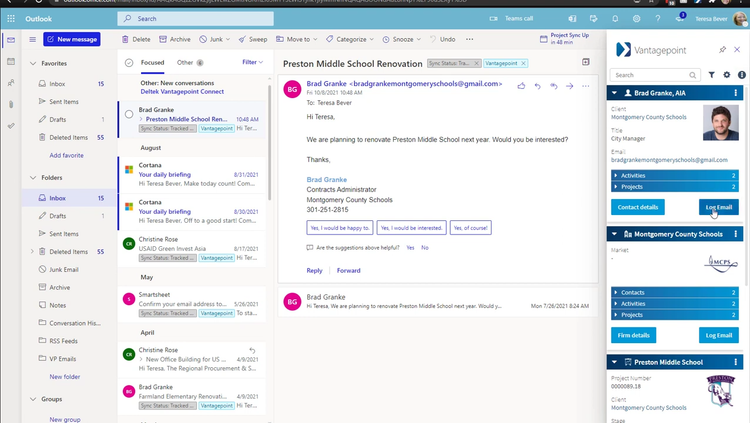
Once you find your firm’s next project, build a winning proposal directly in Vantagepoint’s CRM. The tool lets you create templates for different types of proposals, such as design or technical. It accesses employee descriptions for easy resume generation or project data to use as examples of past successes. This is ideal for growing midsize firms accepting a higher job volume, as starting each proposal from scratch can take several weeks.
Vantagepoint is offered in three different packages: Basic, Advanced, and Ultimate. These packages increase in price and features, so you can choose which plan is the best fit for your business. This flexibility makes it more suitable for midsized firms than all-in-one ERP suites like Unit4.
View our full Deltek Vantagepoint profile for more info.
BQE CORE - Best for Project Management
BQE CORE’s Gantt chart tool helps AE firms manage projects more effectively. While other systems often include this functionality, BQE CORE sets itself apart with its detailed side columns. These show each project subtask and the total amount of resources involved. Other details include the start/end date, duration, completion percentage, and the assigned employee. This gives project managers total visibility into task statuses to identify any miscalculations or delays.
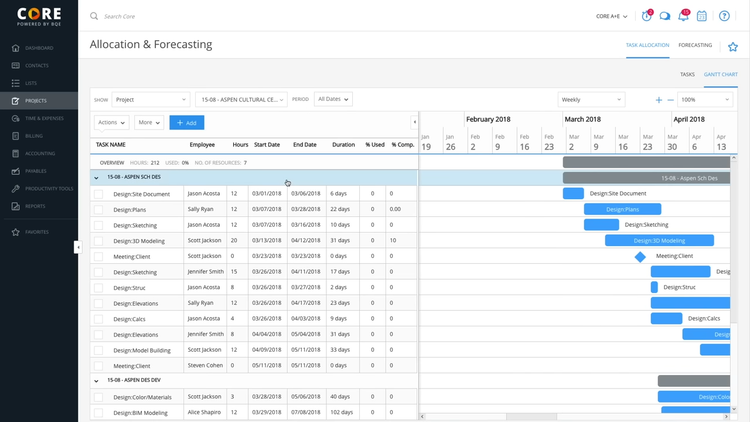
The charts support interdependent tasks to maintain schedule consistency after adjustments. This is crucial in the A/E industry, where progress occurs in distinct stages. For example, if your structural engineer experiences delays while completing their analysis, you can configure the chart to adjust the proceeding jobs accordingly when you extend the timeline. This gives you flexibility when planning projects and keeps schedules running smoothly.
BQE CORE’s Gantt charts integrate with its other modules, so they always show real time data. As team members log their hours on their time cards or complete tasks, the Gantt chart will automatically update the hours worked and progress fields, eliminating the need for manual adjustments.
BQE CORE’s price point is lower than most ERPs due to its à la carte model. The base Foundations package includes the standard time and expense, project management, and invoicing modules. Additional features like accounting, CRM, and HR are optional, so you only pay for what you need.
See our full BQE CORE review to learn more.
Unanet ERP AE - Best for Resource Management
Unanet ERP AE’s resource management module helps PMs manage workloads and optimize schedules for their entire bench. The employee view lists individual team member’s daily or weekly allocated hours. The list drills into each assigned project and task, with color-coded fields indicating whether usage is over or under target. You can even filter by job title, project, and date to quickly access the information you need.
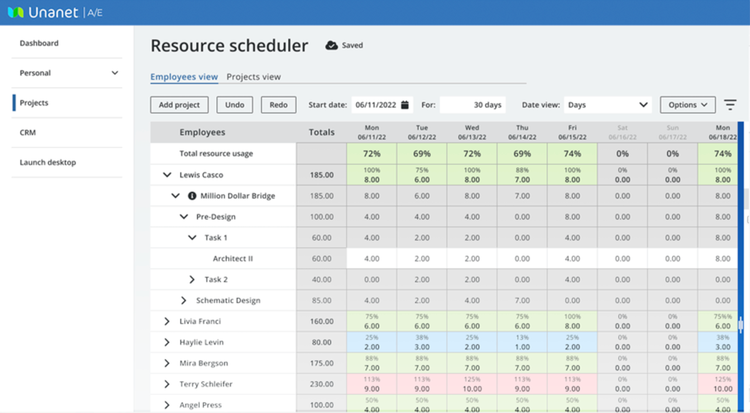
The module also provides capacity forecasting using AI-generated predictive modeling. It leverages historical data, analytics, and sales data from the CRM module to produce resource forecasts to help plan for future needs. These are displayed on dashboards in easy-to-read charts to compare future skills and billable hours demands. This way, sales can align project targets with personnel specialties, like urban planning or interior design.
Additionally, you can run reports on resource and staff-specific KPIs to analyze performance and efficiency across your firm. These can include:
- Net revenue per staff: Calculates the average net revenue each employee contributes to the company to evaluate workforce productivity.
- Scheduled vs. actuals: See which team members work beyond or below their allocated hours and investigate causes, whether it’s poor allocation by the PM or inefficiency.
- Labor budgets by FTE: Projects labor costs by determining how many FTEs (Full-time Equivalents) are needed to fulfill the work requirements; helps determine project labor budgets.
Read more about Unanet ERP AE in our product profile.
Deltek Ajera - Best for Small Firms
Deltek Ajera helps small A/E firms get paid faster through its streamlined invoicing module. The system auto-generates draft invoices from project-specific billable hours and expense reports, so you don’t have to input line items manually. From there, you can add your company logo or make any other modifications and directly email it to the business. This allows you to generate client bills efficiently to improve cash flow.
Management can customize dashboards to analyze invoicing data displayed in charts and graphs. These can include:
- WIP by project: See which projects have the most partially completed unbilled work. This gives you insights into future billings for better cash flow management.
- AR Aging: View outstanding customer invoices categorized by their unpaid time. Drill down and see which clients are late on payments so you can send a reminder.
- Project profits: Track each project’s total profitability in one centralized chart and compare it to the others.
- Invoice review: Contains all drafted and sent invoices in one place for easy reference.
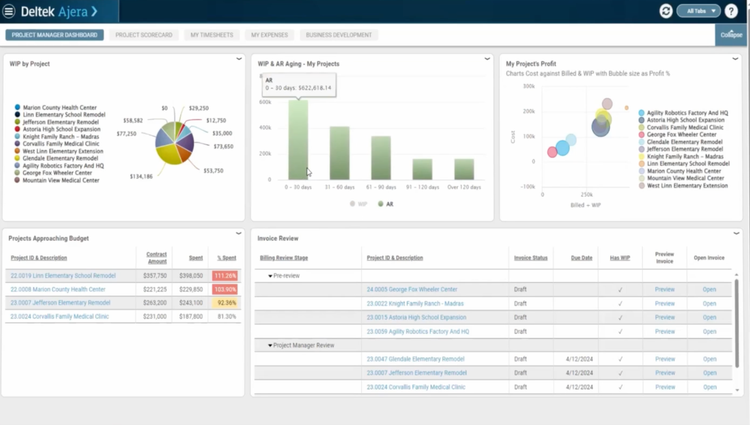
The invoicing module integrates with the time and expense tracking mobile app for efficient project costing. Employees can scan receipts and capture time from anywhere, enabling instant invoice generation for each phase. This is ideal for civil and structural engineers who frequently travel to perform site surveys for infrastructure projects.
Deltek Ajera is an all-in-one ERP with modules for project management, time and expense tracking, and accounting. However, it lacks a CRM module for client tracking, so you’ll have to manage clients from a separate system like Salesforce. BQE CORE is a good alternative with a built-in CRM at a similar price.
Unit4 ERP - Best for Large Firms
Unit4 ERP’s project management module helps large A/E firms organize and deliver complex jobs on time and under budget. You can create flexible structures for different project types, whether industrial or commercial architecture. It even has multi-client and international support to manage different legal entities and accept global currencies in your invoices.
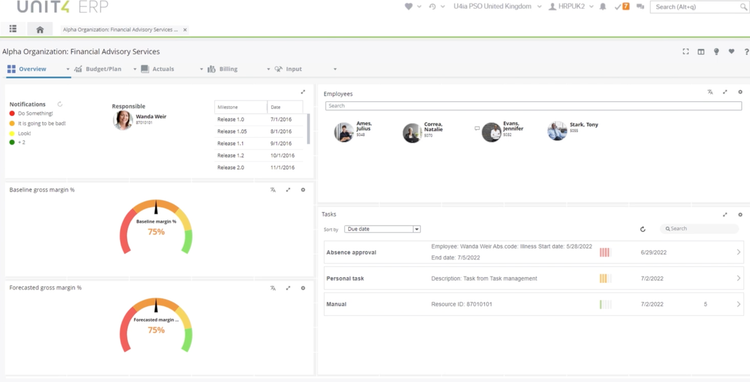
This module also features effective project structuring to create more optimized plans. PMs can segment lengthy contracts into logical phases to set realistic milestones so jobs can stay on track through several months or years. Through its integrations with the HCM module, you can use employee skill data to assign your best people to high-priority tasks while structuring complex jobs.
For further functionality, the project management section integrates with the financial planning module for detailed profitability analysis and budget control. You can create multidimensional reports to see the performance of a specific team or client and compare actuals to budgets. It also includes customizable dashboards to analyze trends and monitor financial KPIs like cash flow per period. This integration streamlines operations for large A/E firms by ensuring real-time synchronization between project and financial management, backing the decision-making process with accurate data.
Unit4 ERP is only suitable for large to enterprise-level companies with over 200 employees. While prices are not publicly available, we estimate the three-year total cost of ownership to be over $100,000. For companies looking for a more affordable ERP, Deltek Vantagepoint is a good alternative.
What is ERP Software for Architecture and Engineering?
A/E ERPs are all-in-one systems that manage projects, resources, finances, and other business operations and are tailored to meet industry challenges. It integrates these functions into a cohesive system, streamlining processes to improve financial health and efficiency.
Common Challenges
The architecture industry faces several challenges that implementing an ERP can address, including:
- Project overruns: Jobs often exceed budget or miss deadlines due to poor planning, unforeseen delays, or poorly allocated resources. Inefficient planning can add significant expenses that make initiatives unprofitable, especially for architecture and engineering projects that can last years.
- Invoicing errors: Projects in this industry often have complex billing structures, and accurately invoicing clients can become a challenge with manual billable hours tracking methods.
- Using several different systems: Startup firms often begin by implementing separate project management and accounting systems. However, as they grow, so do their functionality needs, and using multiple platforms can hinder efficient data flow.
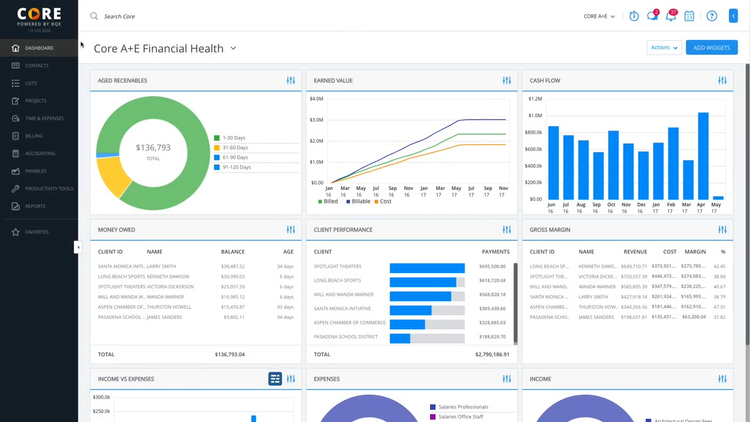
Key Features and Benefits
| Feature | Description | Benefit |
|---|---|---|
| Project management | Efficiently create and schedule tasks, plan project phases, and track progress. | Helps project managers ensure deadlines are met and jobs remain under budget. |
| Financial management | Track budgets vs. actual spending and generate reports on other important metrics like profit and loss. | Provides accurate financial oversight using real time data and helps maximize profitability. |
| Time and expense tracking | Log billable and non-billable hours and create expense reports for each project. | Ensures accurate employee timesheets and client invoices. |
| CRM | Manage client relationships, build proposals, and manage the sales pipeline. | Enhances client satisfaction and retention through a centralized database for easy information reference. |
| Resource management | Allocate resources through skill matching and optimizing schedules based on existing workloads. | Improves employee utilization across the entire company and prevents burnout. |
| Reporting and analytics | Generate reports and create custom dashboards for KPIs. | Analyze and identify trends to make better-informed decisions across all departments, including financial and project sectors. |
| Document management | Keep centralized storage for important documents like drawings, contracts, and other project files. | Helps organize documents for better security and accessibility. Reduces errors from version control issues. |
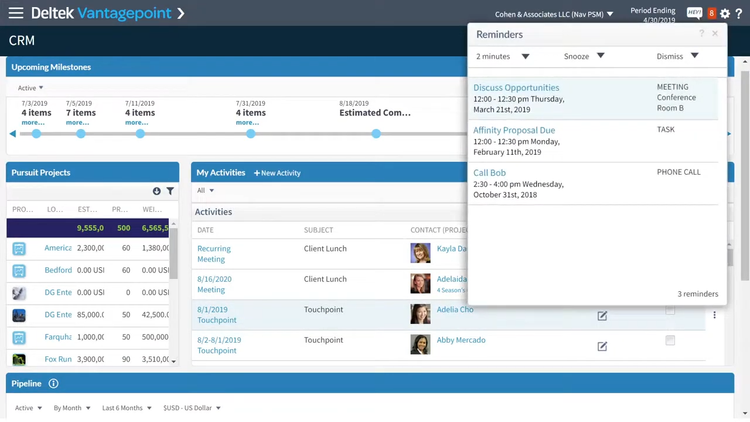
Pricing Guide
ERP systems generally cost between $1,700 to $10,000/month for small to mid-sized businesses. ERP pricing highly depends on several factors, such as your desired modules, cloud or on-premise deployment, and number of users. It’s also important to consider implementation fees, which can significantly increase the upfront cost.
Another important factor is whether the system is sold modularly or in an all-in-one suite. For example, you can choose which modules you want from BQE CORE, while Unanet ERP AE comes with every feature in one package.































